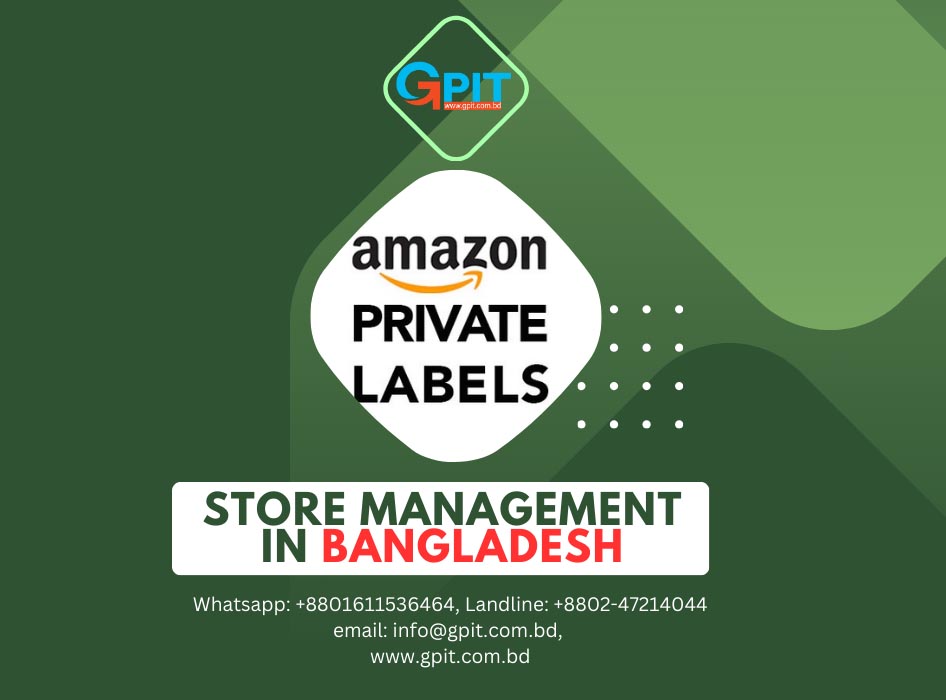
Amazon Private Label Stores Management company in Bangladesh. Outsource Amazon Brand Registration, and PPC Ads to us. Contact: info@gpit.com.bd, Cell: +8801611536464, +880247214044
In the ever-expanding world of e-commerce, Amazon has firmly established itself as a global retail giant. As an online marketplace, it offers endless opportunities for both consumers and sellers. One avenue that has gained significant traction in recent years is the creation of Amazon private label stores. In this comprehensive guide, we will explore what Amazon private label stores are, why they are popular, how to start one, and the key strategies for success.
What Are Amazon Private Label Stores?
Amazon private label stores, often referred to as Amazon private label brands, are products created and sold exclusively on Amazon's platform by independent sellers. These sellers take advantage of Amazon's infrastructure, logistics, and enormous customer base to launch their own brands and products. Unlike reselling or dropshipping, private label store owners have full control over product quality, branding, and pricing.
Why Are Amazon Private Label Stores Popular?
The popularity of Amazon private label stores can be attributed to several factors:
Profit Potential: Private label products typically offer higher profit margins compared to reselling or dropshipping. Sellers can source products at lower costs and sell them under their brand name at a premium.
Control Over Branding: Private label sellers have complete control over the branding and marketing of their products. This allows for building a strong brand identity and customer loyalty.
Reduced Competition: As the brand owner, you face less direct competition from other sellers, especially if you find a niche or unique product to offer.
Amazon's FBA Program: Sellers can leverage Amazon's Fulfilled by Amazon (FBA) program for order fulfillment, making the entire process more efficient and hassle-free.
Access to Amazon's Customer Base: Amazon boasts millions of loyal customers, providing an immediate customer base for private label products.
How to Start an Amazon Private Label Store
Starting an Amazon private label store involves several steps:
1. Market Research
Before diving in, conduct thorough market research. Identify product niches, analyze competition, and understand customer demands. Tools like Jungle Scout, Helium 10, or Amazon's own data can assist you in this research.
2. Source Products
Find reliable suppliers for your products. Alibaba and other sourcing platforms can help you connect with manufacturers. Always ensure product quality, as it reflects on your brand's reputation.
3. Branding
Create a unique and memorable brand name and logo. Invest in professional product packaging and consider adding value through innovative product features.
4. Amazon Seller Account
Set up an Amazon Seller account. Choose between an Individual or Professional account, depending on the scale of your business.
5. Product Listing
Create compelling product listings with high-quality images, detailed descriptions, and optimized keywords. Use Amazon's A9 algorithm to your advantage.
6. Pricing Strategy
Determine competitive yet profitable pricing for your products. Monitor your competitors and adapt your strategy as needed.
7. Fulfillment
Choose between Fulfillment by Amazon (FBA) or Fulfillment by Merchant (FBM). FBA is recommended for its convenience.
8. Marketing and Promotion
Utilize Amazon PPC campaigns, social media, email marketing, and external traffic sources to promote your products. Consider running promotions and discounts.
Key Strategies for Success
To thrive in the world of Amazon private label stores, consider these strategies:
Optimize SEO: Continuously improve your product listings to rank higher in Amazon's search results.
Customer Service: Offer exceptional customer service to build trust and receive positive reviews.
Inventory Management: Keep an eye on your inventory levels to avoid stockouts or overstocking.
Expand Your Product Line: Gradually expand your product offerings to cater to a broader audience.
Stay Informed: Keep up with Amazon's policies and industry trends to adapt your strategy accordingly.
Protect Your Brand: Enroll in Amazon Brand Registry to protect your brand from counterfeits and unauthorized sellers.
In conclusion, Amazon private label stores offer a compelling opportunity for entrepreneurs to build their brands and generate substantial income. However, success in this space requires careful planning, dedication, and a commitment to delivering high-quality products and top-notch customer service. With the right strategy, you can tap into Amazon's vast customer base and build a thriving e-commerce business.